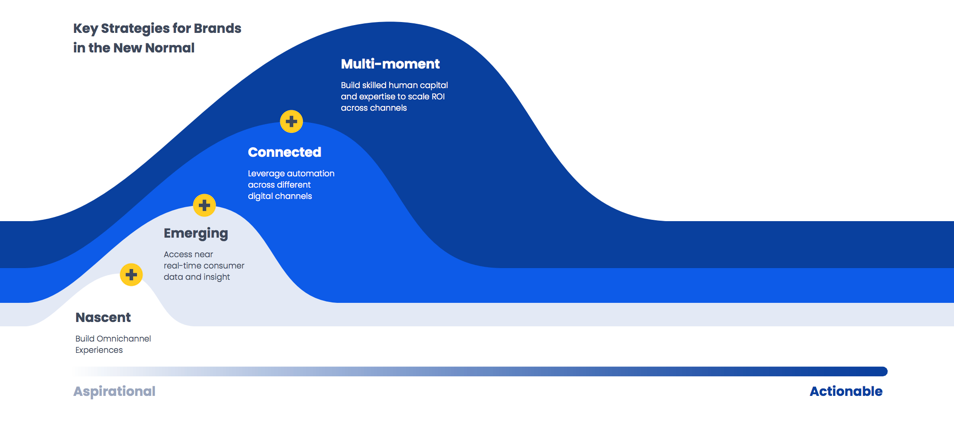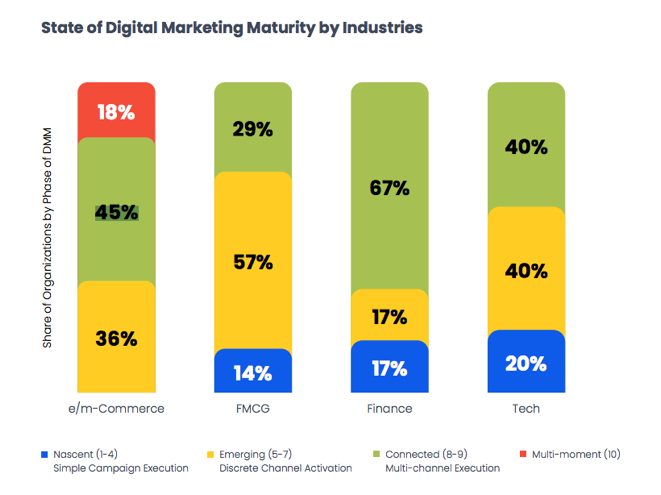Fuel campaign performance with laser-focused targeting

COVID-19 has caused a dramatic shift in consumer behavior, with users moving from offline channels to discover, interact, and purchase online. As a result, brands are reprioritizing their strategies to meet the shifting preferences of consumers. However, the struggle to achieve digital marketing maturity to meet the ever-changing needs of the consumer is real and imperative for marketers.
The Boston Consulting Group (BCG) states that Digital Marketing Maturity (DMM) is an organization’s capacity to deliver seamless brand experiences. The need for DMM is real, and it is so because brands in today’s era of hyperconnectivity often miss striking a chord with the consumer. The evident lack of adopting, optimizing and leveraging digital translates to a barrier in creating meaningful interactions with the consumer.
Depending on how well a brand is equipped in delivering seamless consumer experiences, DMM is categorized into four maturity levels: Nascent, Emerging, Connected, and Multi-moment. The higher the expertise of the brand in delivering measurable outcomes and meeting consumer expectations, the higher is their DMM. According to BCG, companies that achieve the highest level of DMM reported 30% cost savings and 20% increased revenues. InMobi took stock of DMM in 2020 through a survey of senior marketing and media leaders across India and Southeast Asia to further understand the state of DMM.
Based on the survey, we found that the top priority for marketers in the early stages of DMM remains broad and extremely ‘aspirational’ while the multi-moment marketers seek objectives that are highly ‘actionable’ and drive incremental impact with each investment or activity.

As per our survey, e-Commerce and BFSI are the verticals that lead the way with their ability to create connected and multi-moment marketing experiences. It’s fascinating to note that close to half the brand categories are considered to be in the nascent and emerging stages of DMM, leaving a large room for digital growth.

Given the stage of DMM in India, it is intriguing to note how marketers are gauging and prioritizing their marketing goals. While acquiring new consumers is the primary challenge marketers in India focus on today, strengthening brand reputation and consumer trust follows in quick succession to acquisition strategies. Increasing brand awareness stands as the next indispensable priority with retaining the current user base coming in last.
As companies think about their Digital Marketing Maturity through the new decade, it is critical that they traverse the maturity curve or journey with one thing and only one thing in mind – the consumers. COVID-19 has catalyzed several trends. Most noticeably, the transition to a mobile-first world order globally and more so in India with a significant increase in the time spent and consumer spending on mobile. India has one of the largest internet user bases and contributed to 25% of all new Internet users globally in 2020, tallying 734 million (according to TRAI). This user base – urban or rural – accesses the Internet using the mobile, with 90% of the time spent on apps.
In 2021, attaining Digital Marketing Maturity for brands means building Mobile Marketing Maturity via Mobile-first Consumer Intelligence, Mobile Video and Programmatic. Brands must leverage mobile-first consumer intelligence and insights to drive their marketing decision-making. They need to invest in the right technology stack to deliver seamless mobile video experiences at scale and to drive personalization by marrying multiple data signals. Combining the above with automation (programmatic) will maximize efficiencies and impact for brands.
Clearly, the most important question a CMO or marketers needs to ask themselves is about their organization’s Mobile Marketing Maturity.
Learn more and check out your Mobile Marketing Maturity via the 2021 Mobile Marketing Handbook – ‘Marketing in the Era of Mobile


Register to our blog updates newsletter to receive the latest content in your inbox.